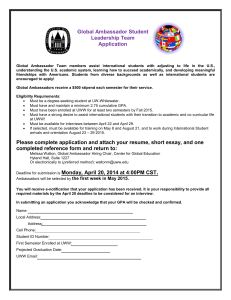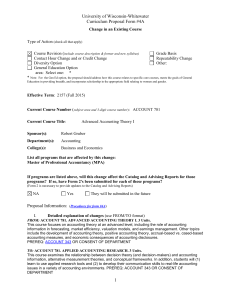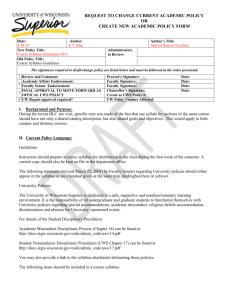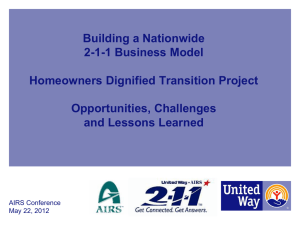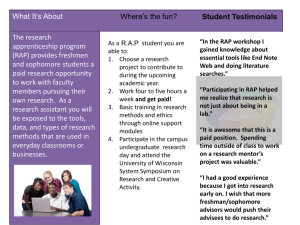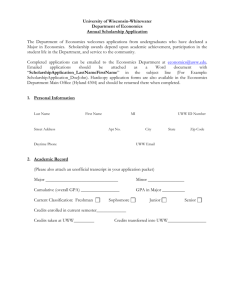MCS 785, Project Management - University of Wisconsin Whitewater
advertisement
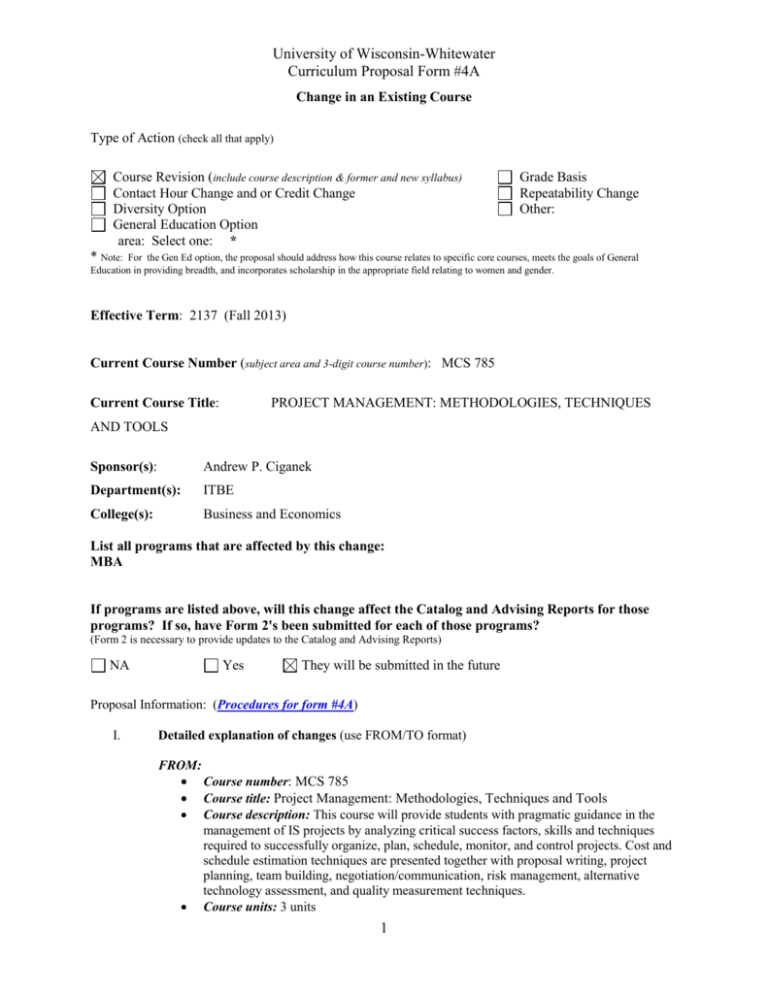
University of Wisconsin-Whitewater Curriculum Proposal Form #4A Change in an Existing Course Type of Action (check all that apply) Course Revision (include course description & former and new syllabus) Contact Hour Change and or Credit Change Diversity Option General Education Option area: Select one: * Grade Basis Repeatability Change Other: * Note: For the Gen Ed option, the proposal should address how this course relates to specific core courses, meets the goals of General Education in providing breadth, and incorporates scholarship in the appropriate field relating to women and gender. Effective Term: 2137 (Fall 2013) Current Course Number (subject area and 3-digit course number): MCS 785 Current Course Title: PROJECT MANAGEMENT: METHODOLOGIES, TECHNIQUES AND TOOLS Sponsor(s): Andrew P. Ciganek Department(s): ITBE College(s): Business and Economics List all programs that are affected by this change: MBA If programs are listed above, will this change affect the Catalog and Advising Reports for those programs? If so, have Form 2's been submitted for each of those programs? (Form 2 is necessary to provide updates to the Catalog and Advising Reports) NA Yes They will be submitted in the future Proposal Information: (Procedures for form #4A) I. Detailed explanation of changes (use FROM/TO format) FROM: Course number: MCS 785 Course title: Project Management: Methodologies, Techniques and Tools Course description: This course will provide students with pragmatic guidance in the management of IS projects by analyzing critical success factors, skills and techniques required to successfully organize, plan, schedule, monitor, and control projects. Cost and schedule estimation techniques are presented together with proposal writing, project planning, team building, negotiation/communication, risk management, alternative technology assessment, and quality measurement techniques. Course units: 3 units 1 TO: II. Course number: ITSCM 785 Course title: Applied Project Management Course description: This course utilizes a formal project management process to convey the key competencies that project managers must develop. Students will apply project management tools and techniques to execute a full project from initiation through closure for a community partner. Topics covered in the course include project management and organization; planning; budgeting; scheduling; resource management; project control; project termination; project management tools; and project completion hours. Emphasis is on hands-on application and practice with project management software tools. Course units: 3 units Justification for action The change in course number is necessary for the phasing out of the MCS degree option. The change in course title and description are minor changes to better reflect the current content covered in the course. III. Syllabus/outline (if course revision, include former syllabus and new syllabus) See subsequent pages 2 FORMER SYLLABUS Course #, Title: Course Prerequisites: Course Units Semester: Instructor: Instructor Contacts: Instructor Office Hours: Class Location: Meeting Time(s): Final Exam: MCS 785, Project Management: Methodologies, Techniques and Tools 3 Spring 2012 Dr. Andrew P. Ciganek Hyland Hall (HH) 3418, (262) 472-6946, and ciganeka@uww.edu MTWR 8:00am – 9:30am, TR 6:30pm – 7:30pm (online) Online Course Description This course will provide students with pragmatic guidance in the management of IS projects by analyzing critical success factors, skills and techniques required to successfully organize, plan, schedule, monitor, and control projects. Cost and schedule estimation techniques are presented together with proposal writing, project planning, team building, negotiation/communication, risk management, alternative technology assessment, and quality measurement techniques. Course Objectives and Expectations During this course, students will: Identify the genesis of project management and its importance to improving the success of information technology projects Demonstrate knowledge of project management terms and techniques such as: o The triple constraint of project management o The project management knowledge areas and process groups o The project life cycle o Tools and techniques of project management such as: Project selection methods Work breakdown structures Network diagrams, critical path analysis, and critical chain scheduling Cost estimates Earned value management Motivation theory and team building Demonstrate project management concepts by working on a group project and role play as either a project manager or an active team member Use Microsoft Project 2010 and other technologies to help plan and manage small projects Evaluate the importance of good project management o Use knowledge and skills developed in this class to analyze project successes and failures o Discuss examples of good and bad project management 3 Grade Evaluation Grade Percent A 100-93 AB 92-89 B 88-85 BC 84-81 C 80-77 D 76-69 F 68-0 Testing & Assignments Activity Team Assignments Credit 35% Online Posts & Discussion 25% Individual Assignments 25% Quizzes 15% Purpose/Description Teams manage a project using a formal project management process. Students individually discuss project management scenarios while watching the podcast lectures. An online "post" consists of a single post to the appropriate discussion forum topic. An online "discussion" consists of multiple posts, at least one responding to the post of another student. Students will work individually to research specific topics that have project management implications to reinforce course materials. Based on readings, assignments, and videos, quizzes will assess the depth of the student’s knowledge base of the topic. Attendance & Participation In an online course, you are not required to show-up in at a particular location and at a particular time. However, you are expected to show-up online. This course is designed to be an active and interactive course in which you contribute and respond to the contributions of others. You should plan to log on and participate in the course at least 3-5 times each week. I will measure this by recording the date of each entry you make to the system--a response to an assignment, an entry into the threaded discussion, submission of an assignment, or participation in group work. Do not "drop out" for a period of time and then expect to "drop back in." If your business/personal obligations or illness require you to be absent for a week, please contact me and arrange to make up the work you will miss. Since you can access this online course from anywhere in the world, there should be little likelihood of "absence". The UW System standard for work required per credit is that students are expected to invest at least 3 hours of combined in-class and out-of-class work per week for each academic unit (credit) of coursework; thus, a 3-credit course will typically require a minimum of 9 hours of work per week (144 hrs./semester). Materials Schwalbe, K. (2010). Revised An Introduction to Project Management, Third Edition. CreateSpace. (ISBN: 978-1451551648) Electronic course support is offered through the Desire2Learn (D2L) course management system. D2L can be accessed online at http://www.uww.edu/desire2learn/. Access the D2L site for all class announcements, assignments, syllabus, course material, and grades. If you don’t know your Net-ID, contact the help desk either by phone during business hours (262-472-4357) or by e-mail (helpdesk@uww.edu). If your Net-ID password does not work, go to http://password.uww.edu and follow the instructions. For all other D2L problems, email d2l-support@uww.edu. A more detailed help can be found by clicking the ‘For Student’ link on the top menu on the D2l Login page. Honor Code 4 As members of the University of Wisconsin – Whitewater College of Business & Economics community, we commit ourselves to act honestly, responsibly, and above all, with honor and integrity in all areas of campus life. We are accountable for all that we say and write. We are responsible for the academic integrity of our work. We pledge that we will not misrepresent our work nor give or receive unauthorized aid. We commit ourselves to behave in a manner that demonstrates concern for the personal dignity, rights and freedoms of all members of the community. We are respectful of college property and the property of others. We will not tolerate a lack of respect for these values. University Policies The University of Wisconsin-Whitewater is dedicated to a safe, supportive and non-discriminatory learning environment. It is the responsibility of all undergraduate and graduate students to familiarize themselves with University policies regarding Special Accommodations, Academic Misconduct, Religious Beliefs Accommodation, Discrimination and Absence for University Sponsored Events (for details please refer to the Schedule of Classes; the “Rights and Responsibilities” section of the Undergraduate Catalog; the Academic Requirements and Policies and the Facilities and Services sections of the Graduate Catalog; and the “Student Academic Disciplinary Procedures (UWS Chapter 14); and the “Student Nonacademic Disciplinary Procedures" (UWS Chapter 17). Special Accommodations Students with documented disabilities through the Center for Students with Disabilities (CSD) are encouraged to discuss their accommodation needs with their instructors during the first week of class. Students must submit their request for services sheet to their faculty. If necessary the forms can be emailed directly to the instructor from the CSD. Students have primary responsibility in coordinating testing accommodations. Students must have instructor approval prior to taking tests. Students who are interested in services should contact the CSD regarding documentation and services. The CSD phone number is 262 472-4711; email csdat@uww.edu Academic Misconduct The University believes that academic honesty and integrity are fundamental to the mission of higher education and of the University of Wisconsin System. The University has a responsibility to promote academic honesty and integrity and to develop procedures to deal effectively with instances of academic dishonesty. Students are responsible for the honest completion and representation of their work, for the appropriate citation of sources, and for respect of others' academic endeavors. Students who violate these standards are subject to disciplinary action. UWS Chapter 14 identifies procedures to be followed when a student is accused of academic misconduct. For additional information, please refer to the section in the Student Handbook titled, Student Academic Disciplinary Procedures. 5 Course Schedule Module Dates 1 3/12 - 3/18 3/19 - 3/25 2 3/26 - 4/1 3 4/2 - 4/8 4 4/9 - 4/15 5 6 4/16 - 4/22 4/23 - 4/29 7 4/30 - 5/6 8 5/7 – 5/13 Topic •Course overview •Lecture 1:Introduction to PM •Lecture 2: Program & portfolio management Spring Break •Lecture 3: Project & program selection • Lecture 4: Project initiation Text 1 2, 3 •Lecture 5: Project scope planning •Lecture 6: Project time planning •Lecture 7: Project schedule & cost planning •Lecture 8: Project quality, HR, communication planning •Lecture 9: Project risk & procurement •Lecture 10: Project quality & HR execution •Lecture 11: Project team, communication, procurement execution •Lecture 12: Earned value management •Lecture 13: Monitoring & controlling scope, time, cost • Lecture 14: Monitoring & controlling quality, communications, risk, procurement •Lecture 15: Project closing •Lecture 16: Project best practices •Online Discussion - "'Mindful' Implement" •Online Post: Team Member Biography •Individual: Balanced Scorecard •Team Project: Project Selection •Quiz 1 (chapters 1-3) 4 •Online Post - "Sample Team Contract" •Team Project: Project Initiation 5 •Online Post - " Running Effective Meetings " •Individual: Microsoft Project •Project Manager: Progress Report 6 •Online Discussion - "Motivating Employees" •Online Post: MBTI Personality Test •Team Project: Project Planning •Quiz 2 (chapters 4-6) 7 •Online Discussion - " WI Project Failures " •Individual: @Task •Individual: EVM •Project Manager: Progress Report 8, 9 6 Work due •Online Post: Student Introduction •Online Post - "Project Success" •Online Post - "Describe PM Job" •Team Project: Team Forum Post •Online Discussion - "Leveraging Collaborative Technologies" •Team Project: Project Executing, Monitoring, Controlling •Individual: Teamwork Rubrics •Team Project: Project Closing •Team Project: Project Notebook •Quiz 3 (chapters 7-9) NEW SYLLABUS ITSCM 785, Applied Project Management (3 credits) Instructor: Dr. Andrew Ciganek Office: Hyland Hall (HH) 3418 Office Phone: (262) 472-6946 Office Hours: MTWR 8:00am – 9:30am, TR 6:30pm – 7:30pm (online) Required Text Schwalbe, K. (2010). Revised An Introduction to Project Management, Third Edition. CreateSpace. (ISBN: 9781451551648) Prerequisites None Course Description This course utilizes a formal project management process to convey the key competencies that project managers must develop. Students will apply project management tools and techniques to execute a full project from initiation through closure for a community partner. Topics covered in the course include project management and organization; planning; budgeting; scheduling; resource management; project control; project termination; project management tools; and project completion hours. Emphasis is on hands-on application and practice with project management software tools. Course Objectives • Identify the genesis of project management and its importance to improving the success of projects • Demonstrate knowledge of project management terms and techniques • Demonstrate project management concepts by working on a group project either as a project manager or an active team member • Evaluate the importance of good project management Student Assessment Successful completion of this course requires that students become highly active participants in the learning process. Students will learn project management process areas and functional knowledge consistent with the Project Management Institute PMBOK® Guide and complete related activities, discussions, quizzes, and examinations. Course content may be taught either as a traditional lecture or online. Grade Evaluation Grade Percent A 100-93 AB 92-89 B 88-85 BC 84-81 C 80-77 D 76-69 F 68-0 Testing & Assignments Activity Team Assignments Online Posts & Discussion Quizzes Credit 50% 35% 15% Purpose/Description Teams manage a project using a formal project management process. Students critically examine project management scenarios. An online "post" consists of a single post to the appropriate discussion forum topic. An online "discussion" consists of multiple posts submitted on multiple days. Based on readings, assignments, and videos, quizzes will assess the depth of the student’s knowledge base of the topic. 7 Attendance & Participation Attendance is expected for each class session. If you must miss a class (for an emergency or illness) you must contact me and your teammates (if during group project) so we can make arrangements for you to make up the work. Two or more unexcused absences will result in one full grade reduction. Materials Electronic course support is offered through the Desire2Learn (D2L) course management system. D2L can be accessed online at http://www.uww.edu/desire2learn/. Access the D2L site for all class announcements, assignments, syllabus, course material, and grades. If you don’t know your Net-ID, contact the help desk either by phone during business hours (262-472-4357) or by e-mail (helpdesk@uww.edu). If your Net-ID password does not work, go to http://password.uww.edu and follow the instructions. For all other D2L problems, email d2lsupport@uww.edu. A more detailed help can be found by clicking the ‘For Student’ link on the top menu on the D2l Login page. Honor Code As members of the University of Wisconsin – Whitewater College of Business & Economics community, we commit ourselves to act honestly, responsibly, and above all, with honor and integrity in all areas of campus life. We are accountable for all that we say and write. We are responsible for the academic integrity of our work. We pledge that we will not misrepresent our work nor give or receive unauthorized aid. We commit ourselves to behave in a manner that demonstrates concern for the personal dignity, rights and freedoms of all members of the community. We are respectful of college property and the property of others. We will not tolerate a lack of respect for these values. University Policies The University of Wisconsin-Whitewater is dedicated to a safe, supportive and non-discriminatory learning environment. It is the responsibility of all undergraduate and graduate students to familiarize themselves with University policies regarding Special Accommodations, Academic Misconduct, Religious Beliefs Accommodation, Discrimination and Absence for University Sponsored Events (for details please refer to the Schedule of Classes; the “Rights and Responsibilities” section of the Undergraduate Catalog; the Academic Requirements and Policies and the Facilities and Services sections of the Graduate Catalog; and the “Student Academic Disciplinary Procedures (UWS Chapter 14); and the “Student Nonacademic Disciplinary Procedures" (UWS Chapter 17). Special Accommodations Students with documented disabilities through the Center for Students with Disabilities (CSD) are encouraged to discuss their accommodation needs with their instructors during the first week of class. Students must submit their request for services sheet to their faculty. If necessary the forms can be emailed directly to the instructor from the CSD. Students have primary responsibility in coordinating testing accommodations. Students must have instructor approval prior to taking tests. Students who are interested in services should contact the CSD regarding documentation and services. The CSD phone number is 262 472-4711; email csdat@uww.edu Academic Misconduct The University believes that academic honesty and integrity are fundamental to the mission of higher education and of the University of Wisconsin System. The University has a responsibility to promote academic honesty and integrity and to develop procedures to deal effectively with instances of academic dishonesty. Students are responsible for the honest completion and representation of their work, for the appropriate citation of sources, and for respect of others' academic endeavors. Students who violate these standards are subject to disciplinary action. UWS Chapter 14 identifies procedures to be followed when a student is accused of academic misconduct. For additional information, please refer to the section in the Student Handbook titled, Student Academic Disciplinary Procedures. 8 Course Schedule Module 1 2 3 4 5 6 7 Topic •Course overview •Lecture 1:Introduction to PM •Lecture 2: Program & portfolio management •Lecture 3: Project & program selection •Lecture 4: Project initiation •Lecture 5: Project scope planning •Lecture 6: Project time planning •Lecture 7: Project schedule & cost planning •Lecture 8: Project quality, HR, communication planning •Lecture 9: Project risk & procurement •Lecture 10: Project quality & HR execution •Lecture 11: Project team, communication, procurement execution •Lecture 12: Earned value management •Lecture 13: Monitoring & controlling scope, time, cost •Lecture 14: Monitoring & controlling quality, communications, risk, procurement •Lecture 15: Project closing •Lecture 16: Project best practices Text 1 2, 3 Work due •Online Post: Student Introduction •Online Post - "Project Success" •Online Post - "Describe PM Job" •Team Project: Team Forum Post •Online Discussion - "'Mindful' Implement" •Online Post: Team Member Interview •Team Project: Project Selection •Quiz 1 (chapters 1-3) 4 •Online Post - "Sample Team Contract" •Team Project: Project Initiation 5 •Online Post - " Running Effective Meetings " •Project Manager: Progress Report 6 •Online Discussion - "Motivating Employees" •Online Post: MBTI Personality Test •Team Project: Project Planning •Quiz 2 (chapters 4-6) 7 •Online Discussion - " WI Project Failures " •Project Manager: Progress Report 8, 9 8 9 •Online Discussion - "Leveraging Collaborative Technologies" •Team Project: Project Executing, Monitoring, Controlling •Team Project: Project Closing •Team Project: Project Notebook •Quiz 3 (chapters 7-9)

